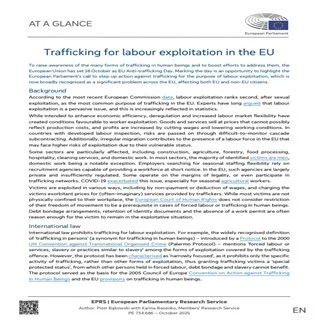By Iotr Bąkowski with Karina Basenko
To raise awareness of the many forms of trafficking in human beings and to boost efforts to address them, the European Union has set 18 October as EU Anti-trafficking Day. Marking the day is an opportunity to highlight the European Parliament's call to step up action against trafficking for the purpose of labour exploitation, which is now broadly recognised as a significant problem across the EU, affecting both EU and non-EU citizens. Background: According to the most recent European Commission data, labour exploitation ranks second, after sexual exploitation, as the most common purpose of trafficking in the EU. Experts have long argued that labour exploitation is a pervasive issue, and this is increasingly reflected in statistics. While intended to enhance economic efficiency, deregulation and increased labour market flexibility have created conditions favourable to worker exploitation. Goods and services sell at prices that cannot possibly reflect production costs, and profits are increased by cutting wages and lowering working conditions. In countries with developed labour inspection, risks are passed on through difficult-to-monitor cascade subcontracting. Additionally, irregular migration contributes to the presence of a labour force in the EU that may face higher risks of exploitation due to their vulnerable status. Some sectors are particularly affected, including construction, agriculture, forestry, food processing, hospitality, cleaning services, and domestic work. In most sectors,the majority of identified victims are men, domestic work being a notable exception. Employers searching for seasonal staffing flexibility rely on recruitment agencies capable of providing a workforce at short notice. In the EU, such agencies are largely private and insufficiently regulated. Some operate on the margins of legality, or even participate in trafficking networks. COVID-19 exacerbated this issue, especially for seasonal agricultural workers. Victims are exploited in various ways, including by non-payment or deduction of wages, and charging the victims exorbitant prices for (often-imaginary) services provided by traffickers. While most victims are not physically confined to their workplace, the European Court of Human Rights does not consider restriction of their freedom of movement to be a prerequisite in cases of forced labour or trafficking in human beings. Debt bondage arrangements, retention of identity documents and the absence of a work permit are often reason enough for the victim to remain in the exploitative situation.
Brussels: EPRS | European Parliamentary Research Service, 2025. 2p.








